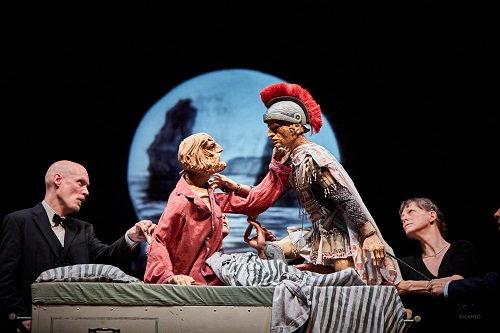 France Monteverdi, Il ritorno d’Ulysse in patria (abridged Kentridge/Pierlot): Soloists, Handspring Puppet Company, Ricercar Consort / Philippe Pierlot (viola da gamba/director). Opéra Royal de Versailles, 18.4.2019. (CC)
France Monteverdi, Il ritorno d’Ulysse in patria (abridged Kentridge/Pierlot): Soloists, Handspring Puppet Company, Ricercar Consort / Philippe Pierlot (viola da gamba/director). Opéra Royal de Versailles, 18.4.2019. (CC)

Production:
Director and Video conception – William Kentridge
Assistant director – Luc de Wit
Scenery – Adrian Kohler and William Kentridge
Lighting – Wesley France
Marionettes and Costumes – Adrian Kohler
Video – Catherine Meyburgh
Cast:
Ulysses – Jeffrey Thompson
Penelope – Romina Basso
Telemacho, Pisandro – Jean-François Novelli
Netturno, Antinoo – Antonio Abete
Melanto, Fortuna, Anfinomo – Anna Zander
Amore, Minerva – Hanna Bayodi
Eumete, Giove – Victor Sordo
William Kentridge’s puppet and video-based production of Monteverdi’s last opera has been around for a while now (since 1998, in fact). My colleague Bernard Jacobson reported on it in March 2009 from Seattle (review). This is a much trimmed-down Ulysses, lasting some one hour, 40 minutes and performed without interval. The instrumental ensemble consists of a mere seven players, arrayed onstage: the entire universe of Ulysses and the Gods is contained within that one space.
The idea of using puppets as characters can work well, as A Funeral for the Queen of Carthage, which included a puppet-based Purcell Dido, proved at the Barbican in October last year (review). This takes the concept further, mixing puppets (each operated by a singer and an ‘extra’ puppeteer) with video installations as well as real humans singing. As a multi-skilled director, Kentridge provides illumination aplenty, his imagery often taken from medicine: MRIs, angiograms and the like, all emblematic of the fragility of the human condition (Kentridge is married to the rheumatologist Anne Stanwix, but the inspiration also came from seeing scans of his five-year-old nephew). It highlights our frailty as mortals, linking to the spirit of human frailty in the Prologue. It also asks another question: we can look into an individual physically all we want, but will we ever know what makes them be who they are? Can we find Love in there? And where would be the space for Gods and Goddesses? The actual variety of images we see is huge, as desolate cityscapes meet pastoral groves (and, of course, an eagle); but it is not sensorial overload. Somehow, it all works beautifully and for sure, warrants revisiting. Ulysses’s beggar disguise is brilliantly realised, for example; the important thing is that we believe what is going on, and we become immersed in the narrative.
The players are raised in a semicircle; in the centre of the stage is a gurney and on that gurney is the puppet of the dead Ulysses. The singers operate the puppets along with a puppeteer – the singers tend to sing towards the puppet, too, rather than at the audience, so our attention is directed to the puppet itself. And as time goes on we, the audience, put our full attention there, too. The utmost tenderness is realisable in this way, as was evidenced time after time after time. The mix of artifice and even ritual play seems perfect for myth, at once distanced from us and yet simultaneously so much a part of our internal landscape.
The realisation of the score was brilliantly managed in both scholastic and performance terms, and in a real sense the true stars of the evening were the instrumental players, ever alert to the shifting emotional landscape. As far as the singers go, this was a brilliant line-up, led by the incredibly expressive American tenor Jeffrey Thompson. Every inch his musico-dramatic equal, the mezzo Romina Basso brought dignity as well as a sense of crushed emotions to the role of Penelope. She herself was balanced beautifully by Anna Zander’s Melanto. (I last saw Zander in 2017 in the heart of the Dordogne where she sang as part of the excellent Quatuor Vocal Sankt Eriksolisterna: review.) There was no sense of any singer eclipsing the other, rather a splendidly chosen cast, all in the service of Monteverdi’s wondrous opera.
Hanna Bayodi excelled as Minerva, while Jean-François Novelli, a name new to me, was beautifully firm of voice as Pisandro and Telemarcho. Tenor Victor Sordo and bass-baritone Antonio Abete embraced their multiple roles with aplomb, Sordo particularly convincing as Giove (Jupiter).
The radiance of the ending was undiminished by the foreshortening of the score, a testament to the success of the idea.
Given the excellence of this, and of John Fulljames’s Royal Opera House’s Roundhouse production in January 2018 (review), it is clear that Ritorno tends to bring the best out of its interpreters. Kentridge’s version, though, is the one I would rush to experience again – there is so much to absorb, one or two times just won’t cut it.
Colin Clarke